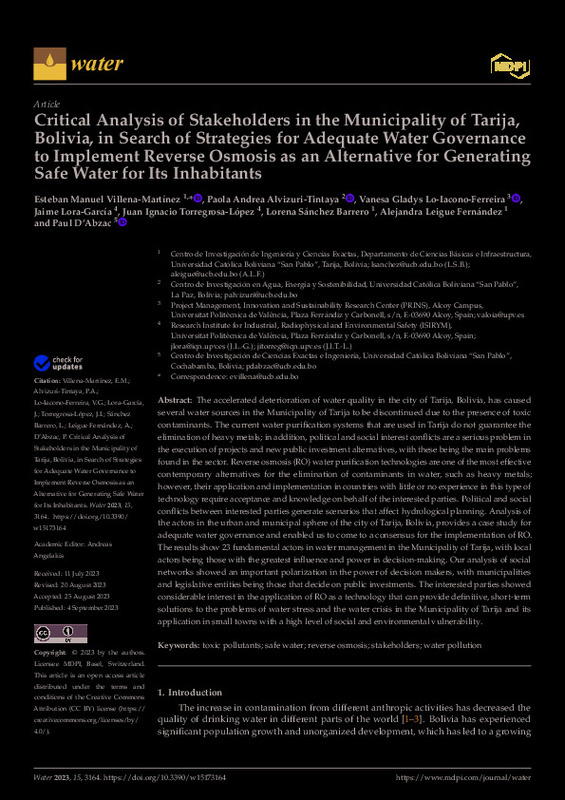JavaScript is disabled for your browser. Some features of this site may not work without it.
Buscar en RiuNet
Listar
Mi cuenta
Estadísticas
Ayuda RiuNet
Admin. UPV
Critical Analysis of Stakeholders in the Municipality of Tarija, Bolivia, in Search of Strategies for Adequate Water Governance to Implement Reverse Osmosis as an Alternative for Generating Safe Water for Its Inhabitants
Mostrar el registro sencillo del ítem
Ficheros en el ítem
| dc.contributor.author | Villena Martínez, Esteban Manuel
|
es_ES |
| dc.contributor.author | Alvizuri-Tintaya, Paola Andrea
|
es_ES |
| dc.contributor.author | Lo-Iacono-Ferreira, Vanesa G.
|
es_ES |
| dc.contributor.author | Lora-García, Jaime
|
es_ES |
| dc.contributor.author | Torregrosa López, Juan Ignacio
|
es_ES |
| dc.contributor.author | Sánchez Barrero, Lorena
|
es_ES |
| dc.contributor.author | Leigue Fernández, Alejandra
|
es_ES |
| dc.contributor.author | D'Abzac, Paul
|
es_ES |
| dc.date.accessioned | 2024-04-11T07:53:49Z | |
| dc.date.available | 2024-04-11T07:53:49Z | |
| dc.date.issued | 2023-09 | es_ES |
| dc.identifier.issn | 2073-4441 | es_ES |
| dc.identifier.uri | http://hdl.handle.net/10251/203323 | |
| dc.description.abstract | [EN] The accelerated deterioration of water quality in the city of Tarija, Bolivia, has caused several water sources in the Municipality of Tarija to be discontinued due to the presence of toxic contaminants. The current water purification systems that are used in Tarija do not guarantee the elimination of heavy metals; in addition, political and social interest conflicts are a serious problem in the execution of projects and new public investment alternatives, with these being the main problems found in the sector. Reverse osmosis (RO) water purification technologies are one of the most effective contemporary alternatives for the elimination of contaminants in water, such as heavy metals; however, their application and implementation in countries with little or no experience in this type of technology require acceptance and knowledge on behalf of the interested parties. Political and social conflicts between interested parties generate scenarios that affect hydrological planning. Analysis of the actors in the urban and municipal sphere of the city of Tarija, Bolivia, provides a case study for adequate water governance and enabled us to come to a consensus for the implementation of RO. The results show 23 fundamental actors in water management in the Municipality of Tarija, with local actors being those with the greatest influence and power in decision-making. Our analysis of social networks showed an important polarization in the power of decision makers, with municipalities and legislative entities being those that decide on public investments. The interested parties showed considerable interest in the application of RO as a technology that can provide definitive, short-term solutions to the problems of water stress and the water crisis in the Municipality of Tarija and its application in small towns with a high level of social and environmental vulnerability. | es_ES |
| dc.description.sponsorship | This study was supported by Subproject 2 of the Agreement for the Implementation of Phase 2 of the Institutional Cooperation Project VLIR UOS IUC-Universidad Católica Boliviana San Pablo between 1 September 2022 and 31 August 2027. | es_ES |
| dc.language | Inglés | es_ES |
| dc.publisher | MDPI AG | es_ES |
| dc.relation.ispartof | Water | es_ES |
| dc.rights | Reconocimiento (by) | es_ES |
| dc.subject | Toxic pollutants | es_ES |
| dc.subject | Safe water | es_ES |
| dc.subject | Reverse osmosis | es_ES |
| dc.subject | Stakeholders | es_ES |
| dc.subject | Water pollution | es_ES |
| dc.subject.classification | INGENIERIA QUIMICA | es_ES |
| dc.subject.classification | PROYECTOS DE INGENIERIA | es_ES |
| dc.title | Critical Analysis of Stakeholders in the Municipality of Tarija, Bolivia, in Search of Strategies for Adequate Water Governance to Implement Reverse Osmosis as an Alternative for Generating Safe Water for Its Inhabitants | es_ES |
| dc.type | Artículo | es_ES |
| dc.identifier.doi | 10.3390/w15173164 | es_ES |
| dc.rights.accessRights | Abierto | es_ES |
| dc.contributor.affiliation | Universitat Politècnica de València. Escuela Politécnica Superior de Alcoy - Escola Politècnica Superior d'Alcoi | es_ES |
| dc.description.bibliographicCitation | Villena Martínez, EM.; Alvizuri-Tintaya, PA.; Lo-Iacono-Ferreira, VG.; Lora-García, J.; Torregrosa López, JI.; Sánchez Barrero, L.; Leigue Fernández, A.... (2023). Critical Analysis of Stakeholders in the Municipality of Tarija, Bolivia, in Search of Strategies for Adequate Water Governance to Implement Reverse Osmosis as an Alternative for Generating Safe Water for Its Inhabitants. Water. 15(17). https://doi.org/10.3390/w15173164 | es_ES |
| dc.description.accrualMethod | S | es_ES |
| dc.relation.publisherversion | https://doi.org/10.3390/w15173164 | es_ES |
| dc.type.version | info:eu-repo/semantics/publishedVersion | es_ES |
| dc.description.volume | 15 | es_ES |
| dc.description.issue | 17 | es_ES |
| dc.relation.pasarela | S\498786 | es_ES |
| dc.contributor.funder | Universidad Católica Boliviana San Pablo | es_ES |
| dc.subject.ods | 03.- Garantizar una vida saludable y promover el bienestar para todos y todas en todas las edades | es_ES |
| dc.subject.ods | 12.- Garantizar las pautas de consumo y de producción sostenibles | es_ES |
| dc.subject.ods | 14.- Conservar y utilizar de forma sostenible los océanos, mares y recursos marinos para lograr el desarrollo sostenible | es_ES |








